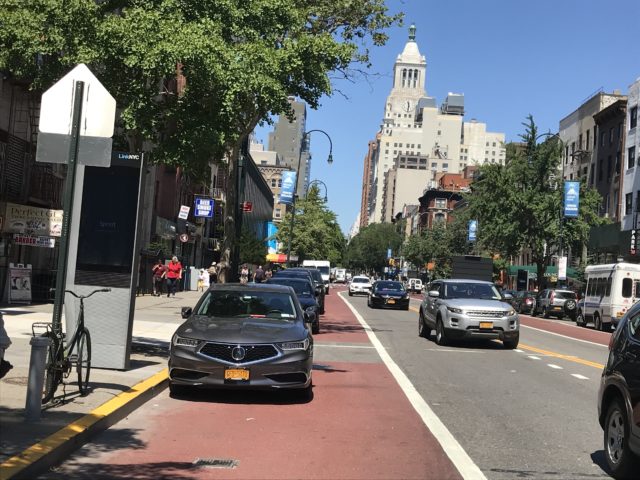Advocates are blasting Mayor de Blasio’s first draft budget, which proposes major cuts to street safety and bus improvement projects — critical programs that are right now helping frontline and essential workers, especially in low-income communities and communities of color, during the coronavirus crisis.
On Thursday, the de Blasio administration revealed the full extent of the cuts in the proposed $89.3-billion fiscal year 2021 budget, which will be $3.4 billion, or 3.7 percent, smaller than the budget for the current fiscal year, which ends in June.
The Department of Transportation cuts [PDF] amount to $61.5 million in the remaining part of FY2020, plus FY 2021. On the chopping block? A team dedicated to cracking down on rampant placard abuse, funding to upgrade citywide parking meters to a license plate-based input system, streetlight maintenance and contract spending, and money for materials and contracts for sidewalk inspection and management.
The city will also eliminate 100 traffic enforcement agents dedicated to intersection control, a savings of $4 million.
The DOT's FY2021 cut represents 5.6 percent of its annual budget, which is less than the cuts to Parks (11.6 percent), and slightly less than to Sanitation (6 percent), but far more than suffered by the NYPD (.7 percent). The DOT also has extensive cuts — a total of $30.3 million — in the out years, long after Mayor de Blasio retires to his Park Slope brownstone.
These cuts come on top of $1.3 billion in previously announced emergency budget cuts — including $3 million in funding for the mayor’s signature Vision Zero public awareness campaign, $4 million for Vision Zero street improvement programs, $3 million for Green Wave projects, $6 million in savings for reducing overnight Staten Island ferry service, and more than $8.4 million in savings for delaying the rollout of the “Better Bus Initiative.”
Advocates said that now was the time to implement the changes the mayor obviously wanted before he cut them out of the budget amid the virus crisis.
“Bus riders are keeping this city running during the pandemic. This is not the time to cut back or delay bus improvements,” said TransitCenter’s Ben Fried. “Getting the bus lanes in place now will benefit the black and brown New Yorkers who are the core of the essential workforce, and improve access to jobs and opportunity as the city recovers from this disaster.”
Transportation and livable streets advocates were already upset about the bus priority cuts, but the indefinite suspension of the Department of Transportation’s Placard Abuse Enforcement Team was more salt in the wound — especially given that the move will only save $1.2 million over the next two years.
New York City will postpone the DOT's "Placard Abuse Enforcement Team," saving $400,000 in FY20 and $800,000 in FY21 and out years
— Anna Sanders (@AnnaESanders) April 16, 2020
That's a small price to pay for cracking down on a form of low-level corruption that eats away at the fabric of a city that the mayor touts as "the most progressive" in the country. Plus, if entitled city employees continue to illegally park their cars after the crisis passes, it will be that much harder for buses to navigate the city's clogged streets, advocates say.
“Placards are bad for bus rides — the more people drive, the more it slows down buses,” said Danny Pearlstein of the Riders Alliance. “Our concern about cutting that program is not just about government integrity, but also a real question about equity, especially now given what we know about essential workers relying on buses."
Placards are an abuse of power. They afford the privilege of lawlessness to a select few. They encourage driving, slowing down buses and endangering peds/cyclists during a #ClimateEmergency. @NYCMayor can end this Tale of Two Cities by abolishing the whole rotten system. https://t.co/W5iVpuWO9a
— Danny Pearlstein (@dannypearlstein) April 16, 2020
The city is not fairly repaying or thanking its front line workers by pausing improvements that were slated for car-clogged bus lines in the Bronx, including on Pelham Parkway, E. 149th Street, and Gun Hill Road — all of which are near public hospitals — said Pearlstein.
“Our public hospitals are really carrying us right now, in particular in the Bronx. Essential workers are essential bus riders,” he said. “Any policy improvements in the aftermath of this pandemic, those people we should thank the most. We need to make sure they have fast and reliable service when cars flood back to the streets.”
But de Blasio defended his massive cuts to bus service and Vision Zero — despite saying two days earlier that "we have to build a city that more and more will rely on mass transit" and less on cars — by arguing that the city can only fund right now what's essential as it seeks to move forward from this crisis, including food, shelter, and safety.
"The most basic things are health, safety, food, shelter. So, we're going to focus there first," de Blasio told Streetsblog on Thursday. "We have to address injustices, we have to create a more fair society coming back, and we have to address the huge crisis of the future, which is still global warming. And that means getting people out of their cars. That we will address in the recovery plans. But right now with the choices we're facing, it goes right back to those basics and it is a statement of values to say we're going to make sure people have, you know, a roof over their head, food to eat, that they're safe, that their health care is protected. That's where we're putting our focus now."






